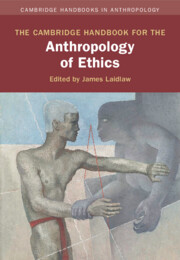Book contents
- The Cambridge Handbook for the Anthropology of Ethics
- Cambridge Handbooks in Anthropology
- The Cambridge Handbook for the Anthropology of Ethics
- Copyright page
- Contents
- Contributors
- 1 Introduction
- Part I Intellectual Sources and Disciplinary Engagements
- Part II Aspects of Ethical Agency
- Part III Media and Modes of Ethical Practice
- Part IV Intimate and Everyday Life
- Part V Institutional Life
- Index
- References
1 - Introduction
Published online by Cambridge University Press: 11 May 2023
- The Cambridge Handbook for the Anthropology of Ethics
- Cambridge Handbooks in Anthropology
- The Cambridge Handbook for the Anthropology of Ethics
- Copyright page
- Contents
- Contributors
- 1 Introduction
- Part I Intellectual Sources and Disciplinary Engagements
- Part II Aspects of Ethical Agency
- Part III Media and Modes of Ethical Practice
- Part IV Intimate and Everyday Life
- Part V Institutional Life
- Index
- References
Summary
This chapter addresses the general character of the ‘ethical turn’ in anthropology and the variety of intellectual styles, reflected in the chapters in this volume, which it has come to include. That variety is such that only two propositions may be said to be generally shared: that the ethical dimension of human social life is non-trivial, and that the understanding of ‘morality’ that is dominant in contemporary Western societies is inadequate for describing and understanding it. In upholding the first of these positions, the anthropology of ethics has departed from those trends in recent anthropology characterized by Sherry Ortner as ‘dark anthropology’. In pursuit of the second, it has attempted to free itself from the imaginative straitjacket of what the philosopher Bernard Williams called the ‘Morality System’, so that it may reckon with the full range of forms of ethical thought, feeling, and practice in the ethnographic record. The chapter also gives a brief overview of the thematic parts of the volume, and the chapters.
- Type
- Chapter
- Information
- Publisher: Cambridge University PressPrint publication year: 2023

